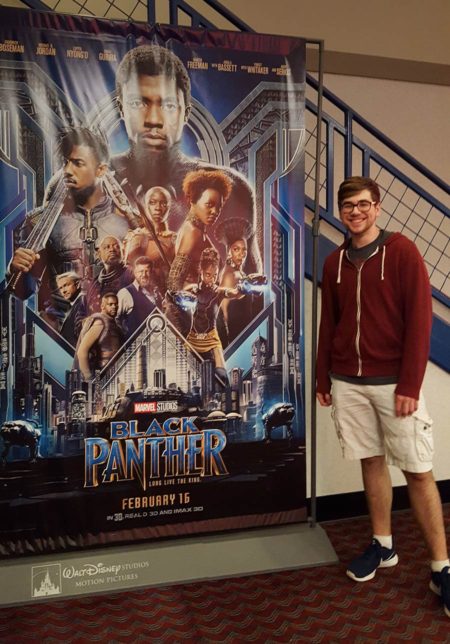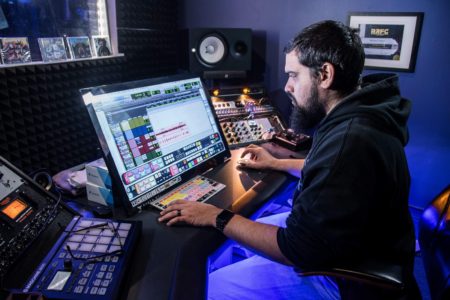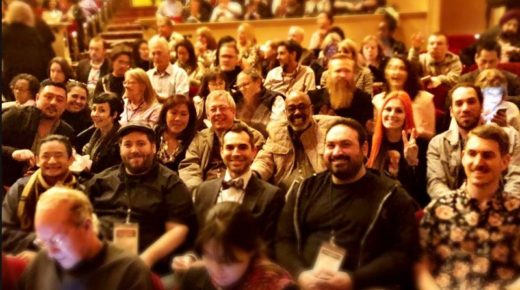Please fill out the following information, and RRFC Admissions will contact you to discuss our program offerings:
Issue #204
by Liya Swift
 The same month Film Connection graduate Jason Reinhardt was finishing his externship with film mentor Steve Carmichael at RITE Media Group, he got hired as a PA on the Black Panther production while they were was doing reshoots in the heart of rural Georgia. So, how did it happen?
We’re big believers in making connections. We say it constantly and consistently and the word is even in our name. So how did Jason get hired on as a PA on the big budget, box-office breaking action movie that’s changing the film business?
Take a guess.
Jason explains, it happened through the connection he made with a friend of his mentor, just one in “the long line of friends that I’ve made through Steve Carmichael.” This connection in particular “has been working on The Walking Dead…and she’s been a key source of a lot of my big jobs, or at least getting me connected with a lot of big employers.”
But working the big productions isn’t all Jason is focused on. He’s invested in working as much as possible and on a variety of different projects. To say he’s being proactive is almost an understatement. He’s attending workshops, working on local and commercial shoots, and basically immersing himself in the process every chance he gets. And yes, he’s got a screenplay in the works too!
Jason has seen, firsthand, how jumping in on one industry event can yield numerous opportunities. When a local networking film group had a meeting at a well-known film equipment rental house, Jason made it a point connect with not only the professional and aspiring filmmakers in the group, but also the people who work at the rental house.
In other words, he was super smart about connecting with the very same people who are on the frontlines of making film, TV, and media in the greater Atlanta area. Shaking hands and getting to know numerous people involved in the day-to-day business, yielded great results.
When a volunteer gig for Rise Against Hunger came up, Jason jumped on it. That further solidified some of the relationships he’d built with people at the equipment rental house, including a manager who asked him to work the 48 Hour Film Fest. He ended the 48 saying, “You guys ever need a PA again, please feel free to reach out.” And sure enough, a few weeks later, they started reaching out.
The connections he made on 48 led to a series of smaller jobs including a photography assistant gig, and then Ant Man 2! Yes, that’s right, Ant-Man and the Wasp!
On that production, when things stalled due to trucking problems, Jason didn’t stay idle. He picked up a broom “and started sweeping the entire stage…a 5,000 square foot stage that we had, and I was just sweeping for an hour, just waiting for the truck…From there the shoot went on, [and I] met a bunch of the cast.”
Jason takes what he does seriously. On the set of Black Panther, when he wasn’t running to assist with something, he was working as the self-described “water boy” handing out cold or room temperature water, according to cast and crew’s preference, and making a positive impression wherever possible.
“I got on good terms with the main villain when he needed cough drops and I was there with a handful. I actually met large majority of the cast including…all of the warriors who protect the king, the main villain, Black Panther, Chadwick Boseman himself, all of the stunt doubles and all of the stand-ins…Overall, the days where a blast. I learned a lot and met a lot of amazing people!”
But so far, the most magical of moment for Jason happened the in the morning as he was driving up to work the Black Panther shoot, located somewhere in the Georgia boondocks.
“No street lights, nothing. It was just straight road and the deep forest as far as the eye can see. The first day that I arrived there was foggy and hazy. As you drove up the mile-long gravel road to the parking lot that they had, you just caught glimpses of props and sets from previous scenes, then you’d see massive cranes moving in the haze. I just kind of got goosebumps while I was driving in, just a giant smile on my face.”
The same month Film Connection graduate Jason Reinhardt was finishing his externship with film mentor Steve Carmichael at RITE Media Group, he got hired as a PA on the Black Panther production while they were was doing reshoots in the heart of rural Georgia. So, how did it happen?
We’re big believers in making connections. We say it constantly and consistently and the word is even in our name. So how did Jason get hired on as a PA on the big budget, box-office breaking action movie that’s changing the film business?
Take a guess.
Jason explains, it happened through the connection he made with a friend of his mentor, just one in “the long line of friends that I’ve made through Steve Carmichael.” This connection in particular “has been working on The Walking Dead…and she’s been a key source of a lot of my big jobs, or at least getting me connected with a lot of big employers.”
But working the big productions isn’t all Jason is focused on. He’s invested in working as much as possible and on a variety of different projects. To say he’s being proactive is almost an understatement. He’s attending workshops, working on local and commercial shoots, and basically immersing himself in the process every chance he gets. And yes, he’s got a screenplay in the works too!
Jason has seen, firsthand, how jumping in on one industry event can yield numerous opportunities. When a local networking film group had a meeting at a well-known film equipment rental house, Jason made it a point connect with not only the professional and aspiring filmmakers in the group, but also the people who work at the rental house.
In other words, he was super smart about connecting with the very same people who are on the frontlines of making film, TV, and media in the greater Atlanta area. Shaking hands and getting to know numerous people involved in the day-to-day business, yielded great results.
When a volunteer gig for Rise Against Hunger came up, Jason jumped on it. That further solidified some of the relationships he’d built with people at the equipment rental house, including a manager who asked him to work the 48 Hour Film Fest. He ended the 48 saying, “You guys ever need a PA again, please feel free to reach out.” And sure enough, a few weeks later, they started reaching out.
The connections he made on 48 led to a series of smaller jobs including a photography assistant gig, and then Ant Man 2! Yes, that’s right, Ant-Man and the Wasp!
On that production, when things stalled due to trucking problems, Jason didn’t stay idle. He picked up a broom “and started sweeping the entire stage…a 5,000 square foot stage that we had, and I was just sweeping for an hour, just waiting for the truck…From there the shoot went on, [and I] met a bunch of the cast.”
Jason takes what he does seriously. On the set of Black Panther, when he wasn’t running to assist with something, he was working as the self-described “water boy” handing out cold or room temperature water, according to cast and crew’s preference, and making a positive impression wherever possible.
“I got on good terms with the main villain when he needed cough drops and I was there with a handful. I actually met large majority of the cast including…all of the warriors who protect the king, the main villain, Black Panther, Chadwick Boseman himself, all of the stunt doubles and all of the stand-ins…Overall, the days where a blast. I learned a lot and met a lot of amazing people!”
But so far, the most magical of moment for Jason happened the in the morning as he was driving up to work the Black Panther shoot, located somewhere in the Georgia boondocks.
“No street lights, nothing. It was just straight road and the deep forest as far as the eye can see. The first day that I arrived there was foggy and hazy. As you drove up the mile-long gravel road to the parking lot that they had, you just caught glimpses of props and sets from previous scenes, then you’d see massive cranes moving in the haze. I just kind of got goosebumps while I was driving in, just a giant smile on my face.”
 With six engineers working at his recording studio, Mixed Wave Labs, Recording Connection mentor Michael Cancel (Chicago, IL) is doing what he loves, making music and teaching tomorrow’s audio engineers and producers the skills they need to get their own careers off on the right track.
But Michael’s professional life wasn’t always so rewarding. There was a time when he had to think long and hard, devise a game plan that worked for him, one that would enable him to achieve his own personal vision of success and fulfillment.
In a recent conversation with Michael we spoke with him about his journey into audio, his belief in staying agile and keeping an innovative mindset in today’s music industry, and why he chooses to mentor with Recording Connection.
With six engineers working at his recording studio, Mixed Wave Labs, Recording Connection mentor Michael Cancel (Chicago, IL) is doing what he loves, making music and teaching tomorrow’s audio engineers and producers the skills they need to get their own careers off on the right track.
But Michael’s professional life wasn’t always so rewarding. There was a time when he had to think long and hard, devise a game plan that worked for him, one that would enable him to achieve his own personal vision of success and fulfillment.
In a recent conversation with Michael we spoke with him about his journey into audio, his belief in staying agile and keeping an innovative mindset in today’s music industry, and why he chooses to mentor with Recording Connection.
 Film Connection mentor Sean McCarthy of Guerilla Wanderers (Bay Area), wrote in to update us on the work our students did on the Cinequest 2018 Festival Trailer, conceptualized and created by the Guerilla Wanderers & Digital Wanderers team!
Sean reports that two Film Connection students Nika Finch and Alex Geranios were “involved as part of our brain trust to show storyboards and animatics where they developed their skills as storytellers and contributed to the piece as it developed and evolved.”
And…
“Eric Whitehead who just graduated from the program, and who we brought back as an associate producer, post production coordinator and animator (he drew one of the robots) — From his training and experience level growing with us, we were able to entrust him with a bigger responsibility…Elizabeth [the producer] and I would both concur he was an essential part of the leadership team and the shining star.
He went from a student we were training early 2017 to a key creative collaborator on this project after he had just received his certification and completed his time in the program.”
Film Connection mentor Sean McCarthy of Guerilla Wanderers (Bay Area), wrote in to update us on the work our students did on the Cinequest 2018 Festival Trailer, conceptualized and created by the Guerilla Wanderers & Digital Wanderers team!
Sean reports that two Film Connection students Nika Finch and Alex Geranios were “involved as part of our brain trust to show storyboards and animatics where they developed their skills as storytellers and contributed to the piece as it developed and evolved.”
And…
“Eric Whitehead who just graduated from the program, and who we brought back as an associate producer, post production coordinator and animator (he drew one of the robots) — From his training and experience level growing with us, we were able to entrust him with a bigger responsibility…Elizabeth [the producer] and I would both concur he was an essential part of the leadership team and the shining star.
He went from a student we were training early 2017 to a key creative collaborator on this project after he had just received his certification and completed his time in the program.”

RRFC is education upgraded for the 21st century.
Get the latest career advice, insider production tips, and more!
Please fill out the following information, and RRFC Admissions will contact you to discuss our program offerings:
Stay in the Loop: Subscribe for RRFC news & updates!
© 2025 Recording Radio Film Connection & CASA Schools. All Rights Reserved.


